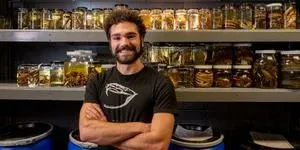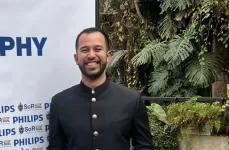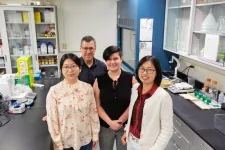(Press-News.org) Boston – George Demetri, MD, director of the Sarcoma Center at Dana-Farber Cancer Institute, is being awarded the prestigious J.E. Wallace Sterling Lifetime Achievement Award in Medicine from the Stanford Medicine Alumni Association (SMAA). Demetri, an alumnus of the Stanford University School of Medicine, Class of 1983, will be honored at a dinner held on the Stanford University School of Medicine campus on December 4, 2023.
“Dr. Demetri is a leader in developing targeted therapeutics for cancer and has been pivotal in advancing oncology treatments over the course of his career,” said SMAA President Deval Lashkari, PhD, ‘96. “We are thrilled to honor his remarkable accomplishments in medicine.”
Demetri received his BA in biochemistry from Harvard College and his MD from Stanford University before completing his internal medicine residency and serving as chief resident at the University of Washington, Seattle. He is currently director of the Sarcoma Center and senior vice president for experimental therapeutics at Dana-Farber, as well as professor of medicine and co-director of the Ludwig Center at Harvard Medical School.
Demetri’s career as a physician-scientist has been dedicated to developing therapeutics targeting specific oncogenic mechanisms to treat precisely defined subsets of sarcomas and other cancers. He has pioneered the development of multiple FDA-approved targeted cancer therapies, including imatinib—the first effective therapeutic for gastrointestinal stromal tumors as a paradigm of a mutation-driven solid tumor.
Demetri’s numerous previous honors include the David Karnofsky Memorial Award from the American Society of Clinical Oncology in 2020. He has served on the American Association for Cancer Research (AACR) Board of Directors and is a member and immediate past chair of the AACR Science Policy and Government Affairs Committee.
END
George Demetri, MD, of Dana-Farber earns Lifetime Achievement Award in Medicine from Stanford University School of Medicine
2023-11-30
ELSE PRESS RELEASES FROM THIS DATE:
Snake skulls show how species adapt to prey
2023-11-30
By studying the skull shapes of dipsadine snakes, researchers at The University of Texas at Arlington have found how these species of snakes in Central and South America have evolved and adapted to meet the demands of their habitats and food sources.
The research, conducted in collaboration with colleagues at the University of Michigan, was published in the peer-reviewed journal BMC Ecology and Evolution.
“We now have evidence that this group of snakes is one of the most spectacular and largest vertebrate adaptive radiations currently known to science,” said Gregory Pandelis, collections manager at UTA’s Amphibian and Reptile Diversity ...
IU researchers develop new brain network modeling tools to advance Alzheimer's disease research
2023-11-30
INDIANAPOLIS—Indiana University researchers are collaborating on a novel approach to use neuroimaging and network modeling tools—previously developed to analyze brains of patients in the clinic—to investigate Alzheimer’s disease progression in preclinical animal models.
The research team, led by Evgeny Chumin, PhD, a postdoctoral research fellow in the College of Arts and Sciences' Department of Psychological and Brain Sciences at IU Bloomington, and Paul Territo, PhD, professor of medicine at the IU School of Medicine, published their findings in Alzheimer’s & Dementia: The Journal of ...
Sea fireflies synchronize their sparkle to seek soulmates
2023-11-30
ITHACA, N.Y. -- In sea fireflies’ underwater ballet, the males sway together in perfect, illuminated synchronization, basking in the glow of their secreted iridescent mucus.
“It’s extreme,” said Nicholai M. Hensley, a postdoctoral fellow in the Department of Neurobiology and Behavior in the College of Arts and Sciences. “It’s an illustration of convergent evolution and a striking example of synchronized bioluminescent mating displays. The males are putting it all out on the dance floor. It’s a big bright display.”
Hensley is the lead author of new research unwrapping the vivid mating ...
Structural racism persists in radiotherapy
2023-11-30
Philadelphia, November 30, 2023 – Everyone should get quality care, no matter the color of their skin. However, implicit bias, micro-aggressions, and a lack of cultural understanding persist, leading to oppression and unequal treatment in healthcare. An insightful article in the new themed issue of the Journal of Medical Imaging and Radiation Sciences on specialized populations, published by Elsevier, highlights this serious problem, specifically addressing the assessment and treatment of radiation-induced skin reactions (RISR) in patients across the world undergoing external beam radiotherapy.
The article provides a stark example ...
BU researcher receives K01 grant to study how nutrition impacts TB incidence, mortality
2023-11-30
(Boston)—Pranay Sinha, MD, assistant professor of medicine at Boston University Chobanian & Avedisian School of Medicine, has received a National Institutes of Health Mentored Research Scientist Development Award (K01). These awards provide support and protected time (three to five years) for an intensive, supervised, career development experience in the biomedical, behavioral or clinical sciences, leading to research independence.
As part of this honor, Sinha has received a five-year, $640,508 National Institute of Allergy and Infectious Diseases grant for his project, “Nutritional Interventions to End Tuberculosis ...
Researchers show an old law still holds for quirky quantum materials
2023-11-30
Long before researchers discovered the electron and its role in generating electrical current, they knew about electricity and were exploring its potential. One thing they learned early on was that metals were great conductors of both electricity and heat.
And in 1853, two scientists showed that those two admirable properties of metals were somehow related: At any given temperature, the ratio of electronic conductivity to thermal conductivity was roughly the same in any metal they tested. This so-called Wiedemann-Franz law has held ever since – except in quantum materials, where electrons stop behaving as individual particles and glom together into a sort of electron soup. ...
Pickier dogs have pickier brains
2023-11-30
Dogs’ food preferences are mirrored in their brain activity, particularly within their caudate nuclei -a brain region associated with reward processing, a new study combining behavioural and neuroimaging data by researchers from the Department of Ethology, Eötvös Loránd University (Hungary) and Symrise Pet Food (France) finds. The study, which seamlessly blends behavioral observations with advanced neuroimaging techniques, offers novel insights into the influence of food quality on dogs' motivation. This work has been published in Scientific Reports.
Similar to people, ...
Despite pressures facing young families, parents take precious moments to play with their babies
2023-11-30
Four in five primary caregivers of nine-month-old babies reported cuddling, talking and playing with their little one several times a day, in England's first national long-term study of babies in over two decades, led by UCL (University College London).
More than half engaged in physical or turn-taking play, singing, pretend games and noisy play with their babies several times a day – activities which were linked to improved early language development. Around three quarters showed their babies picture ...
Combined use of alcohol and THC can affect rat brains, study finds
2023-11-30
The increased legalization of cannabis over the past several years can potentially increase its co-use with alcohol. Concerningly, very few studies have looked at the effects of these two drugs when used in combination. In a series of new studies, researchers at the University of Illinois Urbana-Champaign used rats to understand how brain structure and behavior can change when cannabis and alcohol are taken together.
Most researchers have studied the effects of either alcohol or THC (delta-9-tetrahydrocannabinol), the primary psychoactive drug in cannabis, alone. However, when people, especially adolescents, use these drugs, ...
Tis the season to recognize chocolate: researchers highlight high quality cacao in Colombia
2023-11-30
Scientists are working to protect the unique qualities of cacao beans grown in the Buenaventura region on the Pacific coast of Colombia.
In a study published in the Journal of the Science of Food and Agriculture, researchers from the Colombian Corporation for Agricultural Research (AGROSAVIA) have examined a wealth of metrics to uncover the complex interactions between environmental factors and cacao quality.
In a pioneering move, they have proposed that Buenaventura should be designated as a new Denomination of Origin (DO) for cacao trees. This is a legal recognition given to products that originate ...






